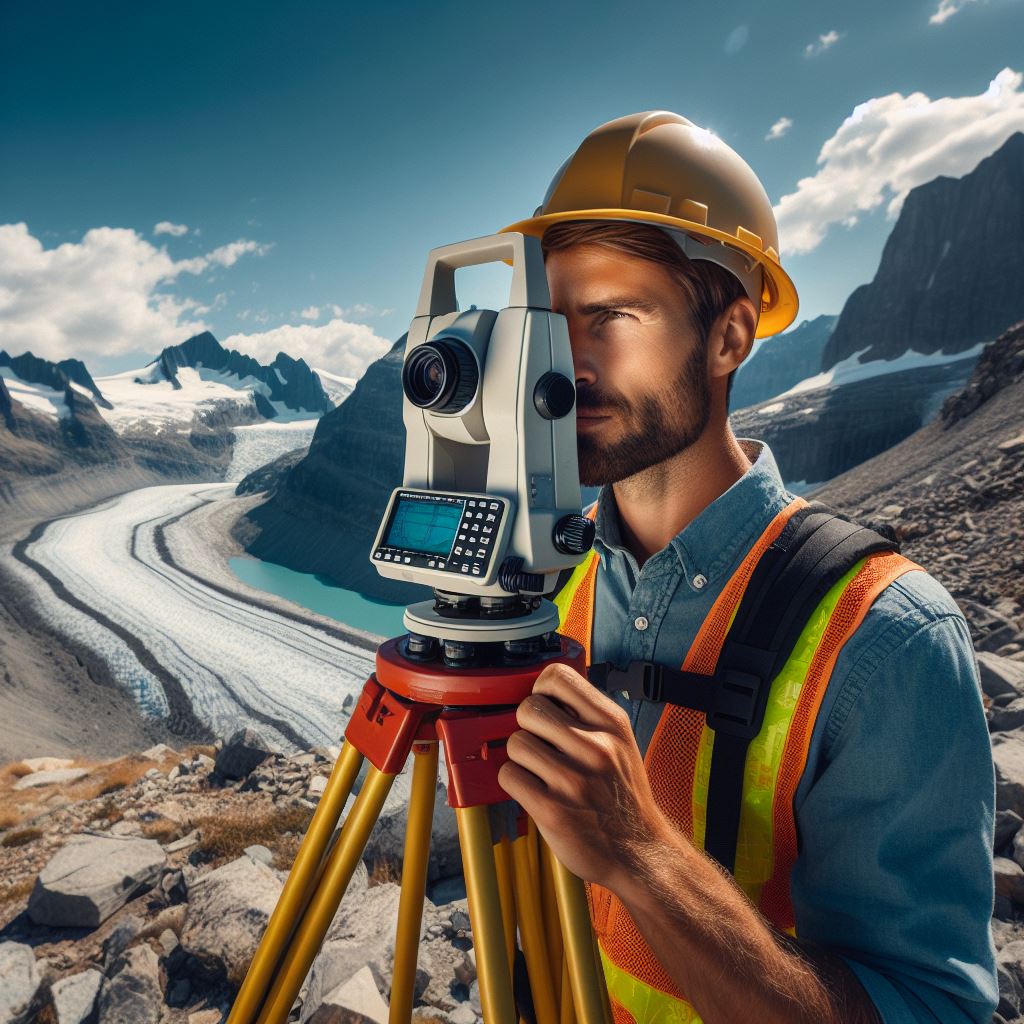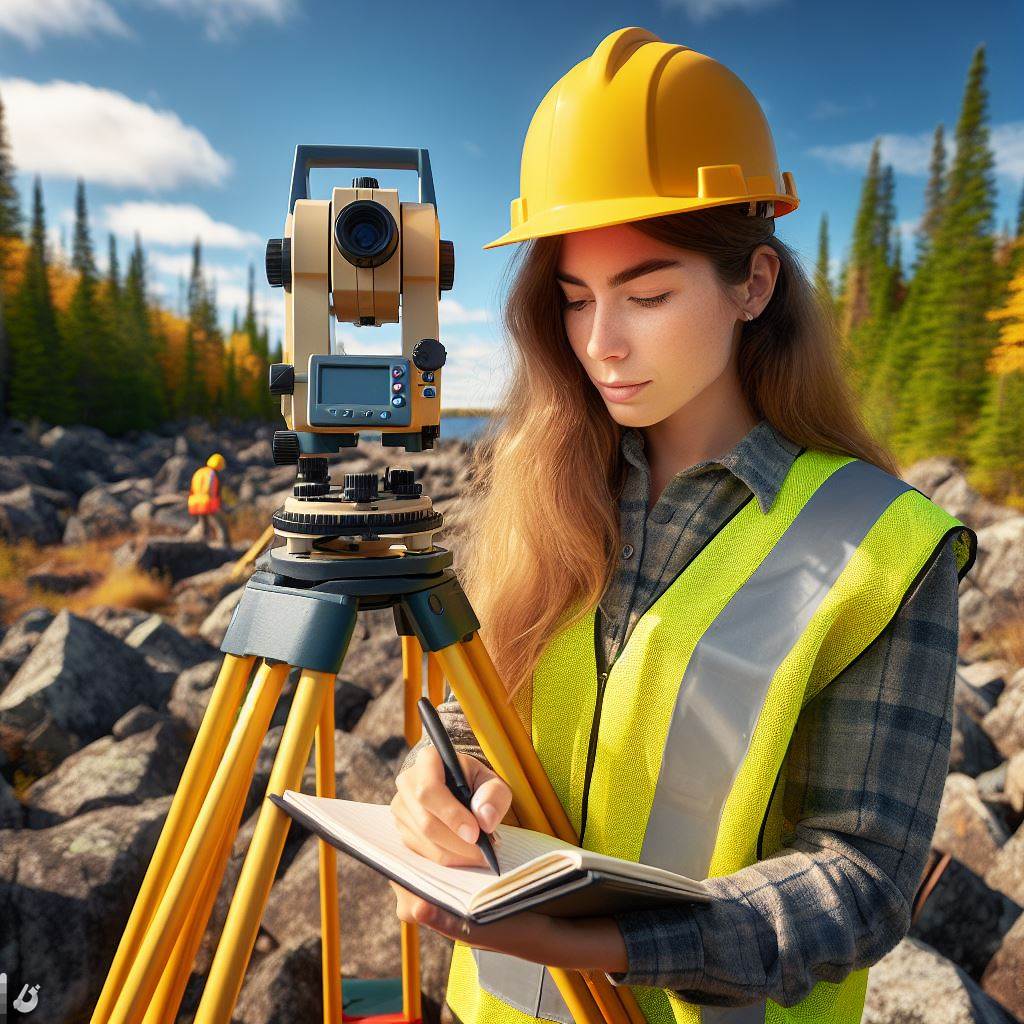Introduction
Surveyors play a vital role in urban planning by collecting and analyzing data for various development projects.
They ensure accurate measurements, boundary delineation, and construction layout. In Canada, there are approximately 20,000 registered surveyors who contribute to the planning sector.
Surveyors, also known as land surveyors, are professionals who measure and map the Earth’s surface.
Their role in urban planning is crucial as they provide accurate data and measurements.
By examining and interpreting this data, surveyors assist in creating comprehensive plans for cities and towns.
Surveyors play a significant role in determining property boundaries and land divisions.
They also contribute to the decision-making process by providing essential information about topography and land use.
In Canada, the number of registered surveyors is around 20,000, reflecting the importance of their expertise in urban planning.
These surveyors are licensed professionals who undergo rigorous training and education to ensure accuracy.
Their work is in high demand due to the constant need for land development and infrastructure projects.
Without the expertise of surveyors, urban planning would be challenging and prone to errors.
Their contribution enables efficient and sustainable urban development.
In short, surveyors are key players in urban planning, providing essential data and measurements.
Their expertise ensures accurate alignment of boundaries and supports informed decision-making.
With approximately 20,000 registered surveyors in Canada, their role in shaping the urban landscape is invaluable.
Who are Canadian Surveyors?
Canadian surveyors are professionals who are trained in the science and art of measuring and mapping the land.
They play a crucial role in urban planning and development by providing accurate data and information.
Definition and Explanation
Canadian surveyors are tasked with measuring and mapping the physical features of the Earth’s surface.
They use specialized tools and technologies to determine precise boundaries, evaluate topography, and establish property lines.
Surveyors play a vital role in various industries, including construction, real estate, and infrastructure development.
Their work ensures that projects are implemented effectively and in compliance with regulations.
Requirements to Become a Surveyor in Canada
Becoming a surveyor in Canada requires a combination of education, training, and practical experience.
- Obtaining a bachelor’s degree in Geomatics Engineering, Surveying, or a related field is the first step towards a career in surveying.
- After completing the degree, aspiring surveyors must acquire practical experience by working under a licensed professional for a specified period.
- Once the required experience is gained, individuals need to pass the licensing examination administered by the provincial or territorial surveying regulatory body.
Professional Organizations and Associations for Canadian Surveyors
Canadian surveyors have access to several professional organizations and associations that support their career development and ensure professional standards are met.
- The Association of Canada Land Surveyors (ACLS) is a national organization that represents surveyors and promotes the profession.
- The Canadian Institute of Geomatics (CIG) is another prominent association that focuses on advancing geomatics and surveying disciplines.
- These organizations provide valuable resources, networking opportunities, and continuing education programs for surveyors.
Different Types of Surveyors in Canada
In Canada, there are various types of surveyors who specialize in different areas of surveying. Some of the notable types include:
- Land surveyors: They are responsible for establishing and maintaining property boundaries and conducting land title surveys.
- Geomatics surveyors: They focus on spatial data collection, such as mapping the Earth’s surface and creating digital models.
- Construction surveyors: They play a crucial role in setting out precise locations for construction projects and ensuring accurate measurements during the building process.
These different types of surveyors collaborate closely to ensure the accuracy and reliability of the data collected and produced.
Unlock Your Career Potential
Visualize a clear path to success with our tailored Career Consulting service. Personalized insights in just 1-3 days.
Get StartedIn fact, Canadian surveyors are professionals with specialized skills in measuring and mapping the land.
Their role in urban planning and development is essential for ensuring accurate and reliable data for various projects.
Becoming a surveyor requires a combination of education, practical experience, and passing licensing examinations.
Surveyors also benefit from professional organizations and associations that support their career development.
With various types of surveyors specializing in different areas, their collaborative efforts contribute to the overall success of urban planning and development in Canada.
Read: Salary Trends for Surveyors in Canada (2024 Update)
The role of Canadian surveyors in urban planning
Urban planning is a crucial aspect of city development, ensuring that communities are designed efficiently and effectively.
Two major factors that contribute to effective urban planning are research and surveying. In Canada, the role of surveyors in urban planning is significant.
Definition and Explanation of Urban Planning
Urban planning is the process of organizing and designing land use in urban areas to achieve sustainable development and improve quality of life.
It involves creating plans, policies, and regulations to guide the growth and development of cities and towns.
This comprehensive process takes into account various factors such as population growth, transportation, housing, infrastructure, and environmental sustainability.
Urban planners work closely with government officials, community members, and professionals in different fields to create well-designed cities and vibrant communities.
Importance of Surveying in Urban Planning
Surveying plays a crucial role in urban planning as it provides accurate data and measurements of land, buildings, and natural features.
This information is essential for making informed decisions about land use and development.
Surveyors use advanced tools and techniques to collect data, such as GPS technology, laser scanning, and aerial mapping.
They measure and map boundaries, topography, land elevations, and determine the location of utilities and infrastructure.
This data is used to identify suitable areas for development, assess potential environmental impacts, and ensure compliance with zoning regulations and building codes.
Surveying also helps in determining land value for taxation purposes and resolving property disputes.
How Surveyors Contribute to Decision-Making Processes in Urban Planning
Canadian surveyors contribute significantly to the decision-making processes in urban planning by providing accurate and reliable information to urban planners.
They assist in identifying potential development sites by surveying the land, assessing its characteristics, and determining its suitability for various purposes.
Surveyors also play a crucial role in ensuring compliance with land use regulations and building codes.
Furthermore, surveyors provide data and analysis that help in evaluating the environmental impact of urban development projects.
They assess factors such as drainage patterns, soil conditions, and natural resource availability to minimize potential negative effects on the environment.
Surveyors also play a crucial role in infrastructure development by surveying the land and determining the most suitable locations for roads, bridges, utilities, and public facilities.
Their expertise ensures that infrastructure projects are efficiently planned and executed.
Collaborative Efforts between Surveyors and Other Professionals in Urban Planning
Collaboration between surveyors and other professionals in urban planning is crucial for successful city development.
Surveyors work closely with architects to ensure that building and structures are designed and located accurately, considering factors such as solar orientation, constraints, and accessibility.
They also collaborate with engineers to incorporate accurate measurements into infrastructure planning and construction.
Policy makers and urban planners rely on surveyors to provide accurate data and analysis to support decision-making and policy development.
Surveyors provide crucial information that enables policymakers to create effective zoning regulations, building codes, and other land management policies.
In essence, Canadian surveyors play a significant role in urban planning by providing accurate data and expertise that contributes to well-informed decision-making.
Their collaboration with other professionals ensures that cities are developed efficiently, sustainably, and in a way that improves the quality of life for residents.
Read: Top Canadian Universities for Aspiring Surveyors

Tasks and responsibilities of Canadian surveyors in urban planning
In the realm of urban planning, Canadian surveyors play a pivotal role in molding the landscapes we navigate daily.
Their tasks and responsibilities encompass a spectrum of activities, each contributing to the intricate tapestry of urban development.
Conducting land surveys to determine property boundaries, topography, and elevations
Canadian surveyors are at the forefront of understanding the lay of the land.
Through meticulous surveys, they determine property boundaries, topography, and elevations.
These surveys provide the foundation for informed decision-making in urban planning.
Collecting and analyzing data for urban development projects
An active force in data-driven urban development, surveyors collect and analyze crucial data.
This data serves as the backbone for projects, offering insights into demographics, environmental factors, and other variables that influence urban planning decisions.
Preparing survey reports and maps for land use plans
One of their key responsibilities is the preparation of comprehensive survey reports and maps.
These documents become invaluable tools for land use plans, aiding policymakers and urban planners in making informed choices that align with the broader vision for the community.
Assisting in the design and layout of infrastructure and construction projects
Canadian surveyors actively contribute to the physical manifestation of urban planning through their involvement in the design and layout of infrastructure projects.
Whether it’s the development of roads or the installation of utility lines, their expertise ensures efficiency and functionality.
Ensuring compliance with legal regulations and standards in land use and development
Navigating the complex web of legal regulations and standards in land use and development is another aspect where Canadian surveyors shine.
Their active involvement ensures that all projects adhere to legal norms, fostering sustainable and lawful urban development.
Canadian surveyors operate in an active and dynamic environment where their every action contributes to the growth and sustainability of urban spaces.
Through their precision in land surveys, contribution to data-driven decision-making, and compliance with legal standards, they are the architects of tomorrow’s cities.
In a nutshell, the tasks and responsibilities of Canadian surveyors in urban planning are multifaceted.
Their work goes beyond merely defining property boundaries; it involves active participation in the holistic process of urban development.
From the meticulous surveys that shape the terrain to the compliance with legal regulations ensuring sustainability, Canadian surveyors are instrumental in crafting the urban landscapes we call home.
Read: Surveying Laws in Canada: What You Need to Know
Challenges and Future Prospects for Canadian Surveyors in Urban Planning
Technological Advancements and Their Impact on Surveying Practices
- Rapid advancement of technology has revolutionized the field of surveying.
- Introduction of laser scanning and drones has improved accuracy and efficiency.
- Surveyors now use GPS technology for precise positioning and data collection.
- Data processing software has made analysis and interpretation faster and more reliable.
- Adapting to these technological changes is crucial for Canadian surveyors to remain competitive.
Addressing the Increasing Demand for Sustainable and Resilient Urban Development
- Urban planners are increasingly focusing on sustainability and resilience in city development.
- Surveyors play a vital role in ensuring that urban projects align with these goals.
- They assess the impact of development on the environment and propose mitigation measures.
- Surveyors collaborate with architects and engineers to create sustainable and resilient design solutions.
- Canadian surveyors must stay updated on green technologies and sustainable practices.
Integration of Geographic Information Systems (GIS) and Remote Sensing in Surveying
- Growing availability of GIS and remote sensing data has transformed surveying methods.
- Surveyors can now access detailed spatial information for comprehensive analysis.
- GIS helps in mapping, analyzing, and visualizing geospatial data for urban planning.
- Remote sensing techniques enable the collection of aerial imagery and terrain data.
- Integration of these technologies improves accuracy and allows for better decision-making.
Opportunities for Career Advancement and Specialization in Urban Planning
- Urban planning offers diverse career opportunities and avenues for specialization.
- Surveyors can specialize in environmental planning, transportation planning, or urban design.
- Advancement in technology opens doors for niche areas like 3D modeling and digital mapping.
- Surveyors with expertise in sustainable development are highly sought after.
- Continuous learning and professional development are essential for career growth in urban planning.
To conclude, Canadian surveyors face both challenges and future prospects in urban planning.
Technological advancements have transformed surveying practices, requiring surveyors to adapt and upgrade their skills.
The increasing demand for sustainable and resilient urban development provides opportunities for surveyors to contribute towards a greener future.
Integration of GIS and remote sensing enhances surveying capabilities, leading to more accurate and informed decision-making.
Lastly, career advancement and specialization options in urban planning enable surveyors to explore various paths and stay relevant in a dynamic field.
Read: How to Become a Surveyor in Canada: A Step Guide
Conclusion
Canadian surveyors play a crucial role in urban planning by providing accurate data and measurements.
They contribute to the development and implementation of urban designs and infrastructure projects.
Surveyors are essential in ensuring that buildings are constructed in compliance with zoning regulations and land-use plans.
They also help in identifying potential environmental and social impacts of development projects.
Despite their importance, surveyors face several challenges in this field.
These include the need to keep up with rapidly changing technology and regulations.
Furthermore, budget constraints and time constraints often put pressure on surveyors to deliver accurate results within limited resources.
However, there are promising prospects for surveyors in urban planning.
As cities continue to grow and develop, the demand for their expertise is expected to increase.
Additionally, the increasing focus on sustainable and smart cities presents new opportunities for surveyors.
To maintain their role in urban planning, continuous education and professional development are crucial.
Surveyors must stay updated on the latest technologies and trends to effectively contribute to urban planning.
They should also actively engage in networking and collaboration with other professionals in the field.
By investing in their professional growth, surveyors can ensure their continued significance in urban planning.




